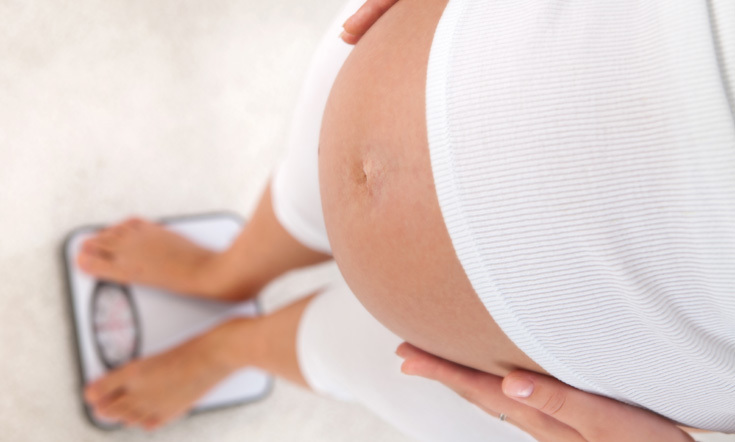

Being pregnant might make you crave a lot of foods such as hamburgers and french fries. It feels good to satisfy your cravings but you should be careful about how much weight you gain during your pregnancy. Gaining too much can be harmful to you and your little one inside your womb. Eating a healthy, balanced diet and gaining a correct amount of weight during pregnancy is a good sign because your baby is getting all the nutrients he or she needs and is growing at a healthy rate.
What Is A Normal Weight Gain During Pregnancy?
If your weight before pregnancy was in a healthy state like BMI of 18.5 to 24.9, 0.5 – 2 kilos in the first trimester and about 0.4 kilo’s every week for the rest of pregnancy. A total of gain weight between 10 and 20 kilo’s is usual.
If your weight prior to your pregnancy is overweight for your height like BMI of 25 to 30, a weight gain of 7 to 10 kilo’s is more ideal. However, if you were obese like BMI of 30 or higher, the gain weight should be between 5 to 8 kilo’s.
If your weight before pregnancy is underweight for your height like a BMI below 18.5, the healthy weight gain for you is between 12 to 18 kilo’s.
For twin pregnancy, the ideal weight gain should be 17 to 25 kilo’s if you had a healthy weight before pregnancy. If you were overweight before pregnancy, it’s 14 to 23 kilo’s and 12 to 20 kilo’s if you were obese.
How To Gain Healthy Weight During Pregnancy?
Before starting a pregnancy weight gain plan, you have to consult your health care provider first. If your doctor recommends gaining more weight, here is some information to guide you.
- Have a five to six small, frequent meals every day.
- Prepare quick, ready to go snacks such as crackers, bread, dried fruits and nuts.
- Make use of peanut butter on your snacks like spreading them on bread, crackers, banana, etc. A table spoon of creamy peanut butter will give you 100 calories and seven grams of protein.
What If I Am Gaining Too Much Weight?
Too much weight gain is dangerous especially in the second trimester, to be more specific, on the 20th week of pregnancy. And the earlier such complications happen, the more difficult confinement a woman will have. It is recommended you take care of their weight and take arterial pressure on both hands and urine tests. Monitoring of blood pressure is also important. If symptoms like oedemas, high blood pressure and presence of albumin is present, you should go immediately in a hospital.
How To Slow Down Pregnancy Weight Gain?
In most cases it is not ideal to have a weight loss plan during pregnancy. However, if gaining more weight than recommended during the beginning of the pregnancy, consult your health care provider. Here is some information to slow weight gain.
- Be sure to talk to your health care provider before participating in an exercise program.
- Regular exercise, as advised by your doctor can help burn excess calories. Walking and swimming is safe during pregnancy and it is an effective exercise for pregnant women.
- When choosing food to eat, pick lower fat foods such as broiled chicken breast sandwich, Caesar salad with low-fat dressing, plain bagels or mashed potatoes. Avoid fatty foods such as hamburger, French fries, cheese sticks, or anything deep fried.
- Limit your intake of sweet and sugary foods and beverages such as cakes, ice cream, soft drinks, fruit drinks, iced tea or lemonade. You can have water, soda water, or mineral water to avoid extra calories.
- Limit intake of saturated fats. Fats include oils, margarine, butter, gravy, sauces, mayonnaise, regular salad dressings, sour cream and cream cheese.
- Avoid whole milk products. You can use skim milk at least four servings of it every day.
- Do not add condiments in your meals. Avoid adding salt to foods when cooking because salt retains water inside the body.
- Cook meals in a low-fat method such as grilling, broiling and steaming.






















